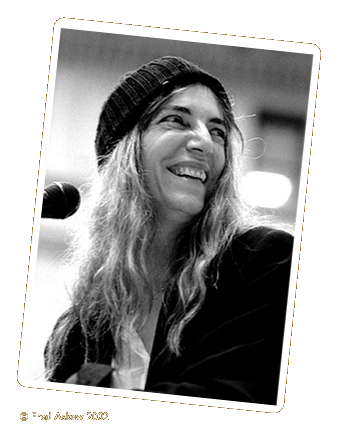 |

|
q&a 2003 / page three Jonathan: Aside from your increasing commitment to politics, which speaks for itself and is inextricable from your work, have you noticed a change in your perception of yourself as an artist since those early days of Piss Factory? Patti Smith: If I did not notice a sense of evolution in my work and in myself, I would be in big trouble. Mary: Do your kids think you're totally uncool or do they appreciate who their mother is and what she has done for music and for culture? Patti Smith: I can't speak for my kids. Hopefully I have been a good mother. That is all I am concerned about in terms of their perception of me. Bob: William Burroughs and Keith Richards, two very different kinds of artists, both seem to have influenced your work, and I'm interested in what it is that attracts you to them: do you see them as having anything in common, and how specifically has each of them influenced you? Could you somehow be seen as the illegitimate offspring of Bill and Keith? Patti Smith: I got my haircut from Keith Richards and my overcoat from William. And my blood from my own father. Peter: As your daughter becomes older and more independent, how do you foresee this affecting your career with the Patti Smith Group? Do you foresee this leading to a more active performing and recording career? Patti Smith: The Patti Smith Group ended in 1979. And I have never been interested in having a career. I have worked with my present band since Gone Again, and we are work driven, not career driven. Amy: Whenever I read interviews you've done, I am amazed at all of your knowledge on so many subjects, in particular writers. I want to know so much, want to read so much, but I feel like I will never be able to acquire enough to satisfy me. Do you ever feel satisfied or is there always something next on your list? Patti Smith: I am excited that there is always something new to learn. I hope that I will never be satisfied. Steve: I saw Noam Chomsky speak on linguistics once, and he answered many detailed, specific questions from the audience about narrow points in government and binding theory. For a final question, someone asked him, "What is freedom?" A great question for a great mind to run with, and his answer was informed by his linguistic theory and study of cognition. So my question for Patti is: From your point of view as a musician, an artist, and a poet, what is freedom? Patti
Smith: To define freedom for oneself, with respect for ones fellow man. |
|
